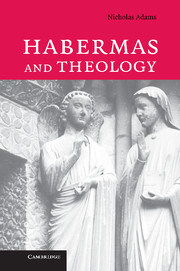Book contents
- Frontmatter
- Contents
- Preface
- 1 Religion in public
- 2 The ideal speech situation
- 3 Authority and distance in tradition
- 4 Sacred and profane
- 5 Universalism
- 6 Theology and political theory
- 7 Theology, social theory and rationalisation
- 8 Modernity's triumph over theology
- 9 Habermas in dialogue with theologians
- 10 Narrative and argument
- 11 Scriptural difference and scriptural reasoning
- List of references
- Index
11 - Scriptural difference and scriptural reasoning
Published online by Cambridge University Press: 23 December 2009
- Frontmatter
- Contents
- Preface
- 1 Religion in public
- 2 The ideal speech situation
- 3 Authority and distance in tradition
- 4 Sacred and profane
- 5 Universalism
- 6 Theology and political theory
- 7 Theology, social theory and rationalisation
- 8 Modernity's triumph over theology
- 9 Habermas in dialogue with theologians
- 10 Narrative and argument
- 11 Scriptural difference and scriptural reasoning
- List of references
- Index
Summary
This final chapter will present an alternative to Habermas' theory of communicative action. This might seem an immodest claim, considering the vastness of Habermas' learning and his extraordinary energy in pursuing a systematic account of communicative rationalisation. It is not such a big claim, however, because no attempt will be made to formulate an alternative theory to that of Habermas, or to engage in an activity comparable to his. The argument presented here has insistently been away from theory which grounds practice and towards attentiveness to particularities which might be translatable from one context to another. Theological critics of Habermas have admittedly to confront a kind of disappointment with settling for the fact of communication between traditions at a formal level rather than an explanation of how it is possible. This disappointment is a good disappointment, because any claim that one can achieve satisfaction at the level of theory or explanation must in principle be bogus, if Schelling's arguments against grounding (reviewed in earlier chapters) are convincing. However, at the level of lived life, they should not try simply to live with disappointment. The ‘fact of communication’ is a fragile matter, beset with many obstacles. Like Habermas, theologians interested in the public sphere should hope to promote more of these ‘facts’ and to refuse melancholy contentment with current damaged practices.
There are many objections to Habermas' theory, some which criticise details, some which aim at very basic questions. For my purposes, two in particular are fatal to his project.
- Type
- Chapter
- Information
- Habermas and Theology , pp. 234 - 255Publisher: Cambridge University PressPrint publication year: 2006
- 1
- Cited by

